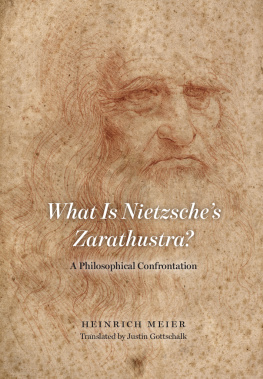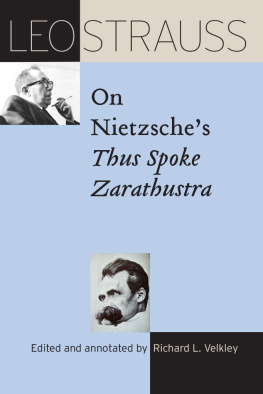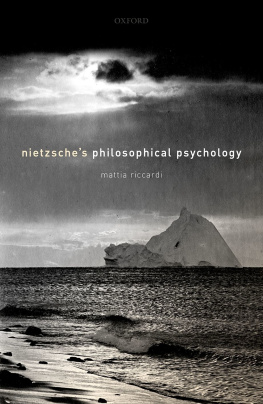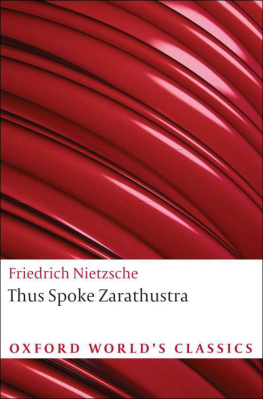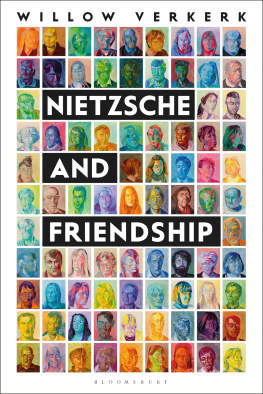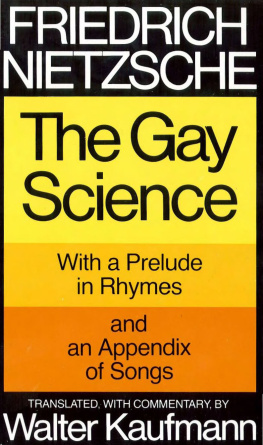Heinrich Meier - What is Nietzsches Zarathustra? A Philosophical Confrontation
Here you can read online Heinrich Meier - What is Nietzsches Zarathustra? A Philosophical Confrontation full text of the book (entire story) in english for free. Download pdf and epub, get meaning, cover and reviews about this ebook. year: 2021, publisher: University of Chicago Press, genre: Romance novel. Description of the work, (preface) as well as reviews are available. Best literature library LitArk.com created for fans of good reading and offers a wide selection of genres:
Romance novel
Science fiction
Adventure
Detective
Science
History
Home and family
Prose
Art
Politics
Computer
Non-fiction
Religion
Business
Children
Humor
Choose a favorite category and find really read worthwhile books. Enjoy immersion in the world of imagination, feel the emotions of the characters or learn something new for yourself, make an fascinating discovery.
- Book:What is Nietzsches Zarathustra? A Philosophical Confrontation
- Author:
- Publisher:University of Chicago Press
- Genre:
- Year:2021
- Rating:4 / 5
- Favourites:Add to favourites
- Your mark:
- 80
- 1
- 2
- 3
- 4
- 5
What is Nietzsches Zarathustra? A Philosophical Confrontation: summary, description and annotation
We offer to read an annotation, description, summary or preface (depends on what the author of the book "What is Nietzsches Zarathustra? A Philosophical Confrontation" wrote himself). If you haven't found the necessary information about the book — write in the comments, we will try to find it.
Heinrich Meier: author's other books
Who wrote What is Nietzsches Zarathustra? A Philosophical Confrontation? Find out the surname, the name of the author of the book and a list of all author's works by series.
What is Nietzsches Zarathustra? A Philosophical Confrontation — read online for free the complete book (whole text) full work
Below is the text of the book, divided by pages. System saving the place of the last page read, allows you to conveniently read the book "What is Nietzsches Zarathustra? A Philosophical Confrontation" online for free, without having to search again every time where you left off. Put a bookmark, and you can go to the page where you finished reading at any time.
Font size:
Interval:
Bookmark:
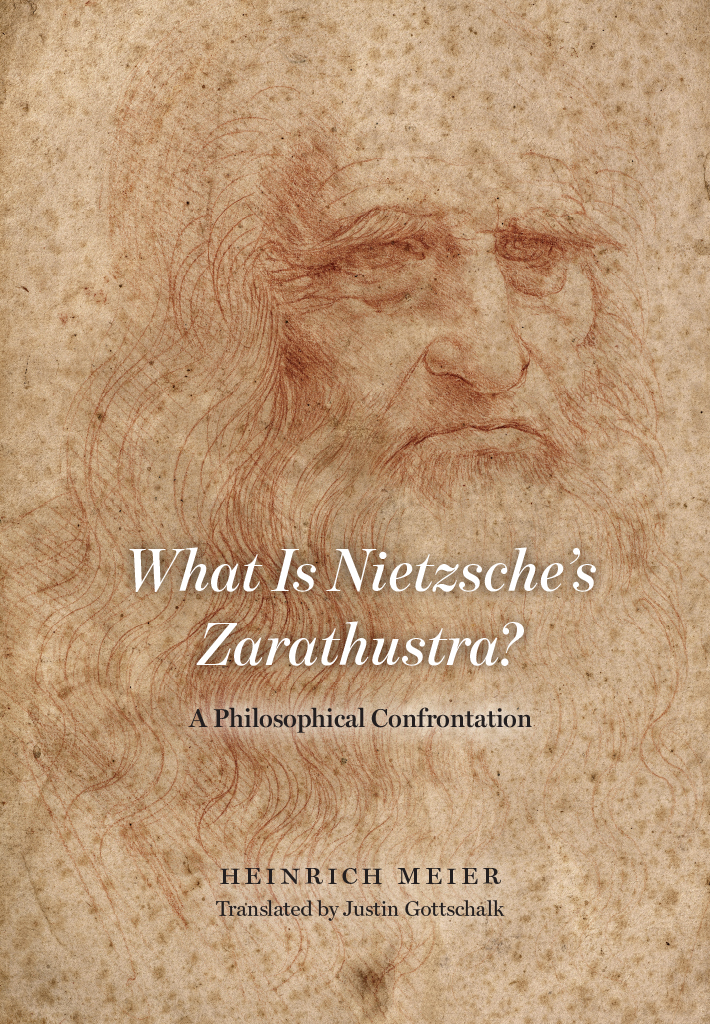
HEINRICH MEIER
Translated by Justin Gottschalk
The University of Chicago Press
Chicago and London
The University of Chicago Press, Chicago 60637
The University of Chicago Press, Ltd., London
2021 by The University of Chicago
All rights reserved. No part of this book may be used or reproduced in any manner whatsoever without written permission, except in the case of brief quotations in critical articles and reviews. For more information, contact the University of Chicago Press, 1427 E. 60th St., Chicago, IL 60637.
Published 2021
Printed in the United States of America
30 29 28 27 26 25 24 23 22 21 1 2 3 4 5
ISBN -13: 978-0-226-58156-9 (cloth)
ISBN -13: 978-0-226-58173-6 (e-book)
DOI : https://doi.org/10.7208/chicago/9780226581736.001.0001
Originally published as Was ist Nietzsches Zarathustra? Eine philosophische Auseinandersetzung by Heinrich Meier, Verlag C.H.Beck oHG, Mnchen 2017
Library of Congress Cataloging-in-Publication Data
Names: Meier, Heinrich, 1953 author. | Gottschalk, Justin, translator.
Title: What is Nietzsches Zarathustra? : hilosophical confrontation / Heinrich Meier ; translated by Justin Gottschalk.
Other titles: Was ist Nietzsches Zarathustra? English
Description: Chicago ; London : The University of Chicago Press, 2021. | Includes bibliographical references and index.
Identifiers: LCCN 2020027894 | ISBN 9780226581569 (cloth) | ISBN 9780226581736 (ebook)
Subjects: LCSH : Nietzsche, Friedrich Wilhelm, 18441900. Also sprach Zarathustra. | Philosophy, German19th century.
Classification: LCC B 3313. A 44 M 4513 2021 | DDC 193dc23
LC record available at https://lccn.loc.gov/2020027894
This paper meets the requirements of ANSI/NISO Z 39.48-1992 (Permanence of Paper).
Friedrich Nietzsche claimed to have given mankind the deepest book with Thus Spoke Zarathustra. If we want to gain clarity over what this gift is all about, the first question has to be: What is Nietzsches Zarathustra? We cannot leave it at the question posed by Martin Heidegger: Who is Nietzsches Zarathustra? Still less can we content ourselves with Heideggers answer, that Zarathustra is the teacher of the Eternal Return. Heidegger and all those who have reiterated his answer seem to have been able to appeal to Nietzsches authority. For in Nietzsches poem Zarathustra is once called the teacher of the eternal return. But it is Zarathustras animals who call him by this name. To equate them with the poet would be as much a mistake as confusing Zarathustra with Nietzsche. In fact, we never see Zarathustra proclaim the teaching of the Eternal Return. And even if Zarathustra were to fulfill the mission with which his animals entrust him, the most important question would remain: What is the teacher of the Eternal Return? A knower or a legislator? A tempter or a religion-founder? A philosopher or a prophet?
The present book attempts to get to the core of the drama that the author unfolds in the works four parts and pursues with the greatest interest by following the question of whether Zarathustra is a philosopher or a prophet, or, if he is supposed to be both, whether he is able to combine philosopher and prophet into One. It grasps Nietzsches Book for All and None as an endeavor of clarification and of separation, of self-understanding and of self-ascertainment. In other words, it understands Zarathustra neither as the mere vessel of a teaching nor simply as his creators mouthpiece. It expressly includes the course of action and the events in the philosophical confrontation and pays no less attention to the inner dialogue and the role of the addressees, the characterization of the figures and situations, than to the doctrines.
With What Is Nietzsches Zarathustra? I present the first yield of an investigation that has preoccupied me for fifteen years. The book serves as preparation for and is the prelude to my confrontation with Ecce Homo and The Antichrist, the dyad with which Nietzsches uvre comes to a close. For the twin writing that I pointed to in the preface of ber das Glck des philosophischen Lebens. Reflexionen zu Rousseaus Rveries [On the Happiness of the Philosophic Life: Reflections on Rousseaus Rveries] in 2010, a new interpretation of Zarathustra proved to be necessary. In the same place where Nietzsche designated Zarathustra the deepest book, he announced in 1888 that he would shortly be giving mankind the most independent book. The present writing shows how Thus Spoke Zarathustra made the independence of Antichrist and Ecce Homo possible, and why Thus Spoke Zarathustra does not reach the same level of independence.
I worked out my interpretation of Thus Spoke Zarathustra in two seminars each on Parts III and IIIIV, which I taught at Ludwig-Maximilians-Universitt in Munich in Winter 20132014 and Summer 2014, as well as in the Committee on Social Thought at the University of Chicago in Spring 2014 and Spring 2015.
H. M.
Munich, June 28, 2016
Es ist noch ganz und gar kein Einwand gegen ein Buch, wenn irgend Jemand es unverstndlich findet: vielleicht gehrte eben dies zur Absicht seines Schreibers, er wollte nicht von irgend Jemand verstanden werden.
FRIEDRICH NIETZSCHE : Die frhliche Wissenschaft
* * *
The Antichrist calls Nietzsches Zarathustra a skeptic. By way of explanation, it adds: A spirit who wants something great, who also wants the means to it, is of necessity a skeptic. It is clear as day that the hero whose speeches and actions Thus Spoke Zarathustra brings to the worlds hearing and places before our eyes wants something great. Yet is what he wants determined by One thing? Does he want One thing? Is he One thing? The Antichrist says of the great passion that rules the skeptic as the ground and the power of his being that it uses up convictions and does not subject itself to them: it knows itself sovereign. The characterization of the great passion that knows itself sovereign and separates the skeptic from the man of faith pertains to exactly One passion. It applies to the passion that Nietzsche, following the crisis into which his philosophical faith plunged him, singles out as the passion of knowledge. At the beginning of the philosophical life in the strict sense, he attributes the passion of knowledge to the philosopher as the passion characteristic of him. Zarathustra the skeptic, to whom the Antichrist draws our attention, proves on closer inspection to be a philosopher. As what, then, do we have to think of Zarathustra? As a philosopher or as a prophet? Does he find his satisfaction in understanding the world? Or is what matters to him, first and last, to change it? Is he guided by the love for men? Does he take revenge on reality? Or is it the passion of knowledge that seizes him in the deepest depths and drives him to the highest heights? If Zarathustra is supposed to be both a prophet and a philosopher, the drama must prove the compatibility of the two personae or else make their conflict obvious.
Closely bound up with the question of whether Zarathustra is One or Two is the other question of whether Nietzsches Zarathustra is a tragedy, or to what extent it is a parody. Nietzsche had announced a tragedy in 1882 when he gave the final aphorism of the Gay Science, which a year later became the first piece of Zarathustras Prologue, the heading Incipit tragoedia. In 1887, after completing his
Next pageFont size:
Interval:
Bookmark:
Similar books «What is Nietzsches Zarathustra? A Philosophical Confrontation»
Look at similar books to What is Nietzsches Zarathustra? A Philosophical Confrontation. We have selected literature similar in name and meaning in the hope of providing readers with more options to find new, interesting, not yet read works.
Discussion, reviews of the book What is Nietzsches Zarathustra? A Philosophical Confrontation and just readers' own opinions. Leave your comments, write what you think about the work, its meaning or the main characters. Specify what exactly you liked and what you didn't like, and why you think so.

